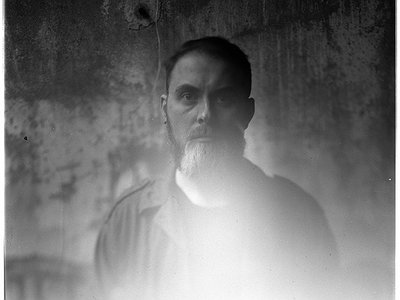Part 2
Could you describe your creative process on the basis of a piece or album that's particularly dear to you, please? Where did the ideas come from, how were they transformed in your mind, what did you start with and how do you refine these beginnings into the finished work of art?
The title track from "Towards the Blackest Skies" is probably my most iterated one. It started with recording a single hit on the acoustic guitar body that became a kick drum, adding a few chords and a banjo (!) riff. None of that is in the finished track except the kick. It was sort of an exercise in call and response, I constantly added more layers to it that matched the previous ones, then muted the thing I started with. At some point, it "clicked" and from then it was obvious how it should come together, as this track-long build up.
There are many descriptions of the ideal state of mind for being creative. What is it like for you? What supports this ideal state of mind and what are distractions? Are there strategies to enter into this state more easily?
There is "flow", the type of work when things start falling into place almost effortlessly around an idea, but it only happens part of the time. Another thing would be coming up with something alien, not instantly recognisable as your own. Once you integrate something like that, then it feels like a genuinely new element. For me the tactic that helps creativity, one that’s worked over and over again, was spending some time outside the city, in the mountains. Being close to nature and having some time for focused work almost always sparks new ideas. I can't stress the importance of eliminating distractions enough, especially in this information-saturated environment we're living in. If you're able to put your phone away for an hour you have a huge advantage already.
How is playing live and writing music in the studio connected? What do you achieve and draw from each experience personally? How do you see the relationship between improvisation and composition in this regard?
Playing live constantly reminds me how the physicality of sound can contribute to composing. You need to be reminded that music doesn't need to be an isolated, introverted headphone experience. Sharing space with others and music that's physically present shifts that perspective. It's also good to plan ahead how the pieces that are created in studio environment will translate into performance on a more technical level. Including the element of risk is essential for both situations in my opinion. Things must have the ability to go wrong on stage to make it exciting. Extending it to the studio work - capturing something improvised, ephemeral will yield the great results.
How do you see the relationship between the 'sound' aspects of music and the 'composition' aspects? How do you work with sound and timbre to meet certain production ideas and in which way can certain sounds already take on compositional qualities?
Composition is the area in which I feel I'm struggling the most. To some degree I still have the mind-set of someone who listened to guitar-centric music quite a lot, and I constantly want to get rid of these limitations. Treating sound design as a starting point is one of the potential ways to dissolve these boundaries. Still, the narrative aspect of music is essential for me.
Our sense of hearing shares intriguing connections to other senses. From your experience, what are some of the most inspiring overlaps between different senses - and what do they tell us about the way our senses work? What happens to sound at its outermost borders?
I've recently become interested in sensory deprivation and how it affects experiencing music. We got so used to visual stimulation with live music, but what if we choose the opposite? Seeing Autechre's live show few years back in complete darkness really opened up my approach to this. A lot can be achieved by manipulating attention in this way. That said, I'm still amazed how fitting the right visuals can take shows to a completely different level.
Art can be a purpose in its own right, but it can also directly feed back into everyday life, take on a social and political role and lead to more engagement. Can you describe your approach to art and being an artist?
I think it gives me a sense of purpose and makes it easier to make choices in everyday life. In the current musical landscape, vastly democratised by technology, more and more people are becoming creators instead of being only passive consumers. It's a huge mass of people if you think about it. When you create in a small niche and you feed something in, regardless how small the group or community, if you take a step back it does something on a wider scale. Either by making people more sensitive, processing everyday experiences differently or exploring different ideas - it creates some kind of value. When you're in this mind-set I suppose you're more likely to invest more energy into experiences and relationships than into pure consumption.
It is remarkable, in a way, that we have arrived in the 21st century with the basic concept of music still intact. Do you have a vision of music, an idea of what music could be beyond its current form?
I'm not sure. I think it will keep evolving in two directions simultaneously - on one hand the development of technology will enable new generations of artists to express themselves in ways that are currently unimaginable. On the other it will constantly revisit its past, creating endless streams of nostalgia that will be able to reach as much into a previous generation, as likely as it is to visit our most primal, tribal proto-musical expressions.





